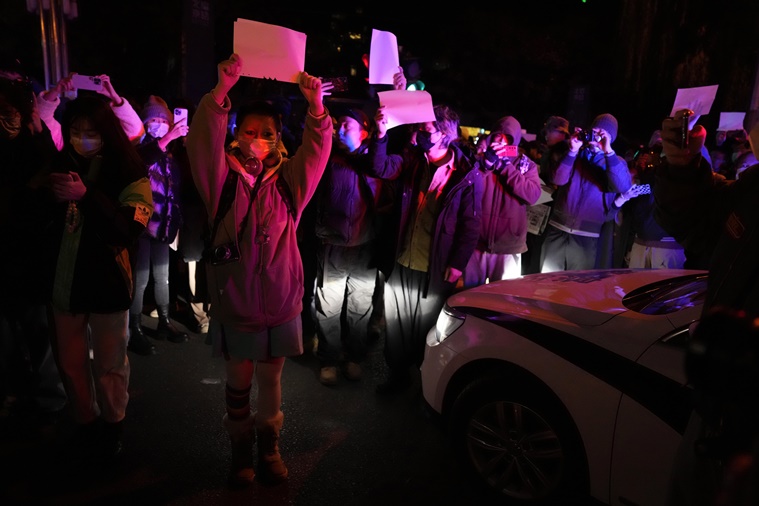Barely a month after he positioned himself as the presumed leader of China for life, there is an unprecedented public outpouring against Xi Jinping’s government’s zero-Covid policy. The policy that dictates a series of snap lockdowns, forced lengthy quarantines and compulsory mass testing until there are zero cases in an area has led observers to ask if Xi’s “full control” has in fact led to “full collapse?”
This past weekend protests raged in over 50 Chinese university campuses, according to a list shared online, and hundreds of people took to the streets in Beijing and Shanghai. Protestors have simply turned to hold up blank sheets of paper to express anger against Covid-19 restrictions which serves as both a smart and effective way to evade censorship while showing solidarity. The blank white paper was a way of saying a lot by saying nothing at all.
The immediate catalyst for the multi-site protests that are spreading across the country was a deadly fire that broke out killing 10 people in Urumqi the capital of China’s northwestern province of Xinjiang last Thursday. While authorities denied claims that Covid restrictions hampered rescue operations, people began to take to the streets toppling barricades and shouting, “end the Covid lockdown.”
What started in Urumqi then spread to anger online and then offline, which also showed a rare solidarity of Han Chinese and minorities rallying around a common cause. In other words, three years after the pandemic began, people in China had had enough of allowing the government to come down hard on personal liberties. A Chinese friend who lives abroad said she was “thrilled, worried and scared” looking at reports of the protests. “I’d join the protests in Beijing if I was there,” she said.
What was unusual and a direct affront to Xi’s regime was slogans that called for the downfall of the CCP and “Xi Jinping Step Down” in Shanghai, and the words “freedom” and “democracy” show up three decades after the 1989 student demonstrations in Tiananmen Square. Washington-based sociologist Professor Yang Zhang took to Twitter to note that: “…full centralized control leads to full responsibility and then national movement targeting at the centre when expectations are not met.”

My Chinese friend sent me a series of Twitter threads she had been following keenly. “I guess young people know these policies are directly from Xi Jinping. The only way for them to just get away from these policies and back to their normal life is to break down Xi Jinping,” she said.
As protestors across campuses and streets are slowly pushed back, arrested, bussed away, and forcibly made to disperse, the Communist Party’s official mouthpiece People’s Daily declared on Sunday that the government will continue to firmly adhere to the zero Covid policy. However, a lot of the messaging from the CCP is in what is subtly said. A Global Times piece re-posted by the People’s Daily on Monday, notes that implementing epidemic control measures has led to “two polarized yet erroneous tendencies” – either a complete lockdown or a ‘lying flat’ meaning no pandemic precautions at all.
Quoting a research fellow at the Chinese Centre for Disease Control, it goes on to say that the State Council has promoted “strict and determined correction” of a ‘one-size-fits-all’ approach’ and excessive policy steps. “Some cities and provinces have issued orders to prevent “one-size-fits-all” approaches of any kind, prohibiting local regulators from imposing extra restrictions on some low-risk areas. For example, Zhengzhou, the capital of Central China’s Henan Province, said on Saturday that a “stay-at-home” order does not mean local residents cannot go out at all. Residents are allowed to go out for medical treatment, emergencies, escape and rescue,” it reads.
As my Chinese friend noted: “It is fair to say that the population of protestors is a lot for Chinese standards, but I am not sure if that translates to much if the state comes down hard on us.” Most slogans are just for personal freedoms to be allowed to leave their homes again, she said. “People are also discussing what this means for Chinese politics but we are all waiting to see what is going to happen next.”
The writer is a Chennai-based journalist. She has lived in and reported from China.









![Best Weight Loss Supplements [2022-23] New Reports!](https://technologytangle.com/wp-content/uploads/2022/12/p1-1170962-1670840878.png)




